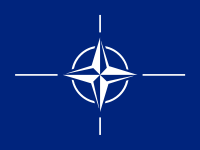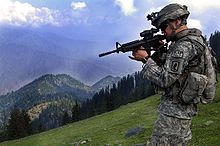 My use of the word schizophrenia refers not to the medical definition, but the meaning more common in general use: a mentality or approach characterized by inconsistent or contradictory elements.
My use of the word schizophrenia refers not to the medical definition, but the meaning more common in general use: a mentality or approach characterized by inconsistent or contradictory elements.
From a variety of news sources over the past few days, clear evidence exists that with regard to America’s role in the Middle East, our actions as a nation are without a doubt schizophrenic.
Here’s a slightly edited quote from Colin Clark at dodbuzz.com: “A task force convened by the prestigious Council on Foreign Relations warns that the current Afghan strategy may not succeed and questions whether U.S. interests warrant such an investment. We are at a critical point. The 112-page report is clearly intended to influence the White House’s review due next month. A declassified version of the White House assessment’s conclusions should be out around the end of the year. The Council on Foreign Relations panel was led by Richard Armitage, former deputy secretary of State under President Bush, and Sandy Berger, President Clinton’s former national security advisor. The report, while noting some achievements such as training Afghan security forces, focuses on whether the current, ambitious strategy is worth the cost of national treasure and can succeed in the face of familiar problems such as corruption and incompetence that face the Afghan and Pakistani governments.”
 Exacerbated by summer flooding, the challenges facing a weak civilian government in Pakistan highlight the stark reality that the Pakistani army does not fight all militants with the same vigor. The country’s tolerance of and even support for extremist groups that target American interests in Afghanistan and the rest of the world undermines the very basis for our relationship and calls into question the possibility of fostering any long-term mutual interests.
Exacerbated by summer flooding, the challenges facing a weak civilian government in Pakistan highlight the stark reality that the Pakistani army does not fight all militants with the same vigor. The country’s tolerance of and even support for extremist groups that target American interests in Afghanistan and the rest of the world undermines the very basis for our relationship and calls into question the possibility of fostering any long-term mutual interests.
Nicholas Kristof, The New York Times: “The United States has provided $18 billion to Pakistan in aid since 9/11, yet Pakistan’s government shelters the Afghan Taliban as it kills American soldiers and drains America’s treasury. Meanwhile, only 8 percent of Pakistanis have confidence in President Barack Obama, according to the Pew Research Center. That’s not even half as many as express confidence in bib Laden.”
Joshua Partlow, The Washington Post: “Afghan President Hamid Karzai said Saturday (11/13) that the United States must reduce the visibility and intensity of its military operations in Afghanistan and end the increased U.S. Special Forces night raids that aggravate Afghans and could exacerbate the Taliban insurgency.”
 Karzai wants American troops off the roads and out of homes and thinks their long-term presence will only worsen the war. It should come as no surprise that his comments put him at odds with the current U.S. strategy of capture-and-kill as the central counterinsurgency component of the war, which required the recent addition of 30,000 more U.S. troops.
Karzai wants American troops off the roads and out of homes and thinks their long-term presence will only worsen the war. It should come as no surprise that his comments put him at odds with the current U.S. strategy of capture-and-kill as the central counterinsurgency component of the war, which required the recent addition of 30,000 more U.S. troops.
Karzai also wants the U.S. to begin to draw down its forces next year, even as he acknowledges that it could be dangerous. In his mind, we should confine ourselves more to our bases and limit operations to only those necessary on the Pakistani border. He describes the goal as “. . . to reduce the intrusiveness into Afghan daily life.”
Okay, so I’m confused when I try to reconcile the words of SecDef Gates as discussed in a previous post, “History on Our Side.” If we’re in Afghanistan at the invitation of their “elected” government (quotes intended due to reports of widespread voting fraud), then we should be assisting them according to their wishes. But, of course, we aren’t, because we’re really there for different reasons.
What’s so hard to understand about being played for the fool? Can we not recognize the way in which countries in the Middle East play both ends against the middle?
 Listening to the talking-head blather from our illustrious leaders, however, you can only conclude that we’re winning. Never mind that the Taliban insurgency is more violent than at any point since the U.S. invasion after 9/11. NATO forces are paying a heavy toll. Afghan public enthusiasm for the government is waning after years of unmet expectations. The economy, devastated by more than thirty years of war, has not recovered sufficiently to provide for the people, while the government remains largely ineffective and riddled with corruption.
Listening to the talking-head blather from our illustrious leaders, however, you can only conclude that we’re winning. Never mind that the Taliban insurgency is more violent than at any point since the U.S. invasion after 9/11. NATO forces are paying a heavy toll. Afghan public enthusiasm for the government is waning after years of unmet expectations. The economy, devastated by more than thirty years of war, has not recovered sufficiently to provide for the people, while the government remains largely ineffective and riddled with corruption.
And in the midst of all this, a senior White House official told reporters last Tuesday that their review would judge how well or badly the current strategy is faring but will not offer new strategic choices. Wow. How comforting, especially for the troops fighting and dying over there.
From insidedefense.com we get more reaction to the Council’s report on the study: “. . . the current approach to the region is at a critical point,” and “. . . for now, the United States should assume the lead, with the goal of encouraging and enabling its Pakistani and Afghan partners to build a more secure future. Yet even the United States cannot afford to continue down this costly path unless the potential for enduring progress remains in sight. After nine years of U.S. war in the region, time and patience are understandably short.”
 Really. Whose time and whose patience are short? Not that of the politicians, or the American public, either. Take a look at “Heed the wars that beget veterans” by Robert McCartney of The Washington Post. Along with asking a service member just returned from Afghanistan or Iraq if they’ve saved anybody rather than if they’ve killed anybody, here’s what veterans of those conflicts wish: resume paying attention.
Really. Whose time and whose patience are short? Not that of the politicians, or the American public, either. Take a look at “Heed the wars that beget veterans” by Robert McCartney of The Washington Post. Along with asking a service member just returned from Afghanistan or Iraq if they’ve saved anybody rather than if they’ve killed anybody, here’s what veterans of those conflicts wish: resume paying attention.
McCartney: “The veterans fought there, often on multiple tours. They saw friends get wounded or killed. They care deeply about the progress and outcome of the two wars. This nation, however, has lost interest. There was virtually no debate about the wars in the campaigns leading up to the midterm elections.”
Or how about a quote from Todd Bowers, deputy executive director of the Iraq and Afghanistan Veterans of America, who served three combat tours in the region: “There was zero discussion of the wars, which every veteran was tracking. We’re getting tired (of it). We get the handshakes and the thank yous for your service, and then everybody changes the channel, they turn the page, they look in another direction.”
 That should come as no surprise to anyone. Only a small fraction of the population is fighting the nation’s battles abroad. Less than one out of 200 Americans has served in Afghanistan or Iraq, as opposed to one out of ten During WWII, and the nation finds it far too easy to ignore the wars when so few people are directly involved.
That should come as no surprise to anyone. Only a small fraction of the population is fighting the nation’s battles abroad. Less than one out of 200 Americans has served in Afghanistan or Iraq, as opposed to one out of ten During WWII, and the nation finds it far too easy to ignore the wars when so few people are directly involved.
This travesty persists because America is collectively wearing blinders. If we don’t pull them off and acknowledge the schizophrenia so pervasive within our foreign policy, we will only descend further into the depths of national political, cultural, and financial bankruptcy.


